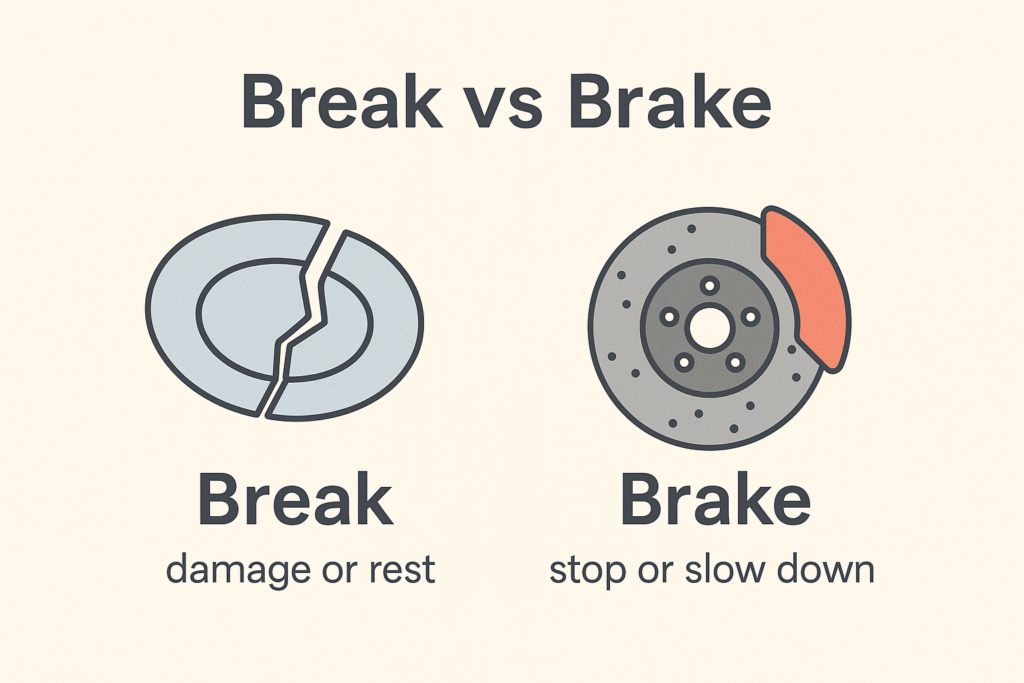Break vs Brake: Know the Difference

The words break vs brake may sound the same, but they serve very different purposes in English. As homophones, they are often misused in writing even by native speakers. One refers to damage or interruption, while the other deals with stopping motion particularly in vehicles.
So, what’s the difference between break vs brake? Quite a lot. Understanding their grammatical roles and correct contexts will save you from common writing mistakes and potential confusion.
In this article, we’ll explore the grammar, provide real-life examples, discuss common errors, and give you memory tips to help you always choose the correct word when dealing with break vs brake.
Grammatical Explanation of break vs brake
Let’s break down the grammar behind break and brake:
- Break can be a verb or noun.
As a verb, it means to damage, shatter, or interrupt:
He might break the glass.
As a noun, it can mean a pause or an act of breaking:
She took a short break. - Brake can also be a verb or noun, but it’s used in relation to slowing down or stopping movement, especially in vehicles.
As a verb: He braked suddenly at the red light.
As a noun: Her car’s brakes need fixing.
When choosing between break and brake, remember that “break” is about damage or rest, while “brake” is all about stopping movement.
Real-Life Examples of break vs brake
Here are some clear examples showing how to use break vs brake correctly:
Break (damage or rest):
- Don’t break the plate, its fragile.
- Let’s take a coffee break.
- She had to break the news to him gently.
Brake (stop or slow down):
- He slammed the brake to avoid hitting the dog.
- You need to brake earlier on wet roads.
- The mechanic replaced the rear brakes.
Incorrect usage:
- She hit the breaks hard.
She hit the brakes hard. - Let’s take a brake before continuing.
Let’s take a break before continuing.
Using the right word in the break vs brake pair can drastically improve clarity, especially in written communication.
Common Mistakes
A major mistake people make with break vs brake is using the wrong spelling when referring to vehicles or rest periods.
- I need to get my breaks checked.
I need to get my brakes checked.
(You’re referring to car parts, not shattering something.) - Let’s take a quick brake.
Let’s take a quick break.
Another common error is misusing “brake” in idioms or casual speech where “break” is appropriate.
Always ask: Are you talking about stopping or damaging? This one-question test helps you instantly tell brake vs break apart.
Memory Tips
Here are some simple ways to remember the difference between break vs brake:
- Break = Damage or Rest
Think: “If it’s broken, it’s a break.”
Also, you take a break (pause), not a “brake.” - Brake = Stop
Think: “A car has brakes to help it break movement.”
Or: Brake with an ‘A’ = Automobile.
Mnemonic trick:
- “E” for break = End or Energy stop (rest).
- “A” for brake = Auto.
Once you connect brake with stopping and break with damaging or resting, it becomes much easier to use them correctly.
Conclusion
Distinguishing break vs brake is all about context. Use break when you’re talking about damage or taking a pause. Use brake when referring to slowing or stopping, especially in vehicles.
Want to explore more tricky homophones? Check out our breakdown of Seem vs Seam to learn how appearance and stitching get confused in writing.
Need more clarity? Visit Merriam-Webster’s definitions of break and brake for deeper insights.